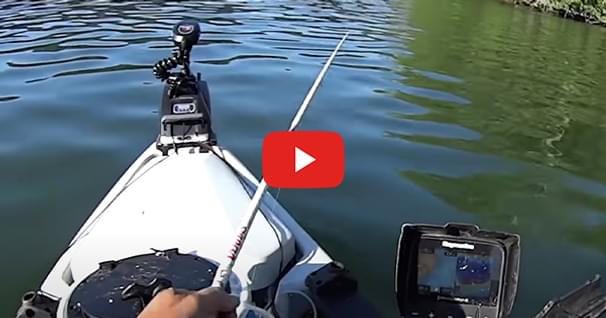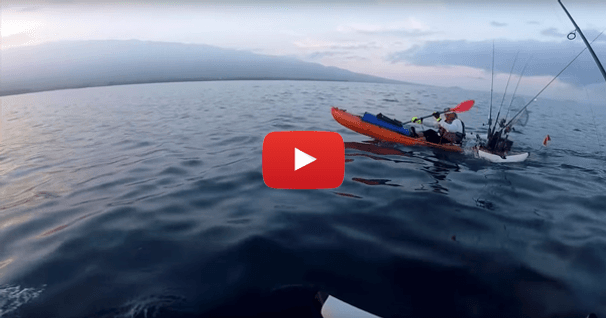Back to School for Anglers
Back To School
Normally, I close my articles with a quote. I still will, but this time I'd like to start with one:
"Men are anxious to improve their circumstances, but are unwilling to improve themselves;
they therefore remain bound."
~ James Allen
I find a lot of truth in this. Let's say you're at a dead end job, you start sending out resumes, you get another job (if you're lucky), only to find you're not much better off than you were before. Your circumstance was possibly improved, but without some self-improvement, the end result remains unchanged - you're still bound.
I mention this because it's "back to school" time. Kids have new backpacks, new shoes, and are on fire to gain more knowledge. Well, two out of three ain't bad. I'm taking some night classes to try and improve myself in an occupational way, but I've also been attending some other classes - kayak fishing classes. I don't care how much you *think* you know, there's always room for perspective, and more importantly - knowledge. Think about it: Phil Mickelson has a swing coach, Michael Phelps has a swimming coach, Ozzy has a speech therapist (who by now probably needs his own therapist, of a different sort). Here's my point: I love this sport (fishing from a self-powered craft), I love the process (the prep and the recon), and I love writing about it all. But, we all can use a coach - me included. In my case, these classes reminded me of things I already know, along with soaking up some local knowledge that I'd never be able to get on my own.
I gained both of those things by attending a couple of kayak fishing seminars conducted by a local kayak fishing guide Neil Taylor who runs Strike Three Kayak Fishing. He's more than a guide, because he also offers instruction. Improve yourself, and no longer will you be bound.
In all my years of playing guitar in bands, I would get accustomed to playing the same songs night after night. Over time, I'd impart a little something here and there, only to discover that over time I had detoured miles away from how the song "should" be played. Only by listening to crude bar tapes, would I learn that in some cases I was missing the basics - delivering icing with no cake. So, this seminar gave me what I deem to be priceless reminders of what I should be doing if I expect to catch fish. Here's what I took away from the seminar, and hopefully it will help you refocus your energy as well. Most of this is not new. But I hope these topics jog your memory and enable you to be more effective.
PREPARATION:
To be successful in school, you need to have all of your necessary school supplies close at hand. I have tried and tried to make myself better prepared. I have often assumed that preparation meant having all the lures for any occasion. That is not necessary. What is necessary is having the proper lures for the conditions I expect to find. For example, right now the eel grass is dying off and during the outgoing tide I see islands of the stuff passing me by. So, that means I don't need to take every flavor of topwater plug I own when I fish. I should take one or two, but not a tray of ten. It's a common sense thing - take what you expect you will need, but don't take all that you own. So, after the seminar, I scaled my "needs" way down. I went out the following weekend, had 2 small tackle trays and didn't use half of that. I still caught fish. And after all, that *is* still the goal here. The simplicity of just having less "stuff" in my work area made for a much more pleasurable day.
EMBRACE YOUR WORK AREA:
Let's say the bow of your boat is 12 o'clock. Hold your hands at 10 and 2 - this represents your work area. This area is reserved for ONLY what is necessary. Let's talk about what is necessary:
- Lures / tackle: You only need what you might be using under certain conditions. You may need other choices when the tide changes or when the creek widens, but for now, keep only what you need in the office. Should conditions change, you can spend a few minutes getting tackle from that bulging bag in your tankwell. If you're using bait make sure you have extra hooks and weights in the work zone.
- Tools: Our sport is enhanced by having certain tools. But they are of little value if they're not readily accessible. So now, before I leave shore, these things are close at hand. The trophy fish could happen on the first cast, so best be prepared for it.
Let me take a few moments to give you a tour of my new and improved office. In the left storage pouch I have my UHF radio, pliers, and sharpening stone. In the right pouch I have leader, a stick of sunscreen, and my lip gripper (and a camera). In the center tray I have line clippers, braid scissors, and the select lures that I deem necessary for the conditions I expect to encounter. Since I was expecting lots of floating grass I took a variety of soft baits that I could rig weedless. I also had a selection of jig heads and hitch hiker hooks.
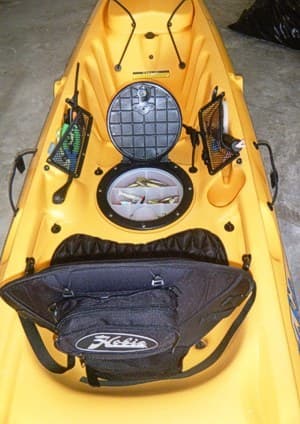
Still, I'm not quite ready to leave all my hard baits at home. The dreaded eel grass might *not* be present and I'd be kicking myself if I didn't a few lures onboard. Since that tackle tray is removable, it also opens up the hull for additional storage. DING!
On each side of the hull I applied some velcro (tooth side up). Then, I applied the cloth side of the velcro to a couple small tackle boxes.
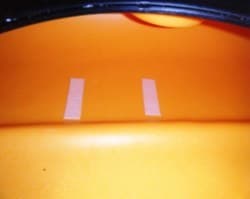
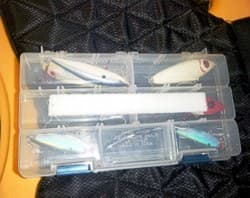
The result is having 2 tackle boxes containing the "plan B" lures within easy reach. The great thing about this set-up is that in order to put the trays back in the hull I only need to put them in the general area and the velcro does its job.
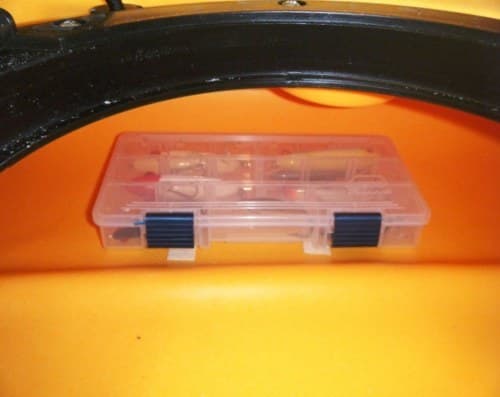
GO WHERE THE FISH ARE:
Sounds simple, but lately I have been going where *I* want to, hoping fish would be there. In my area, tides play a huge part, but in fresh water there are migratory and spawning patterns that need to be observed as well. 90 percent of fish are caught in 10 percent of the water. So you need to study up and place yourself where the fish may be, or at least will be passing through. Successful fishing is a combination of planning and preparation. "Luck" has been defined as the point where planning and preparation meet, and I couldn't agree more. Two weeks ago, I was fishing an outgoing tide in a location where snook should be feeding (good current, several ambush points). I could see bait in the water (menhaden, aka "greenbacks") so I matched the hatch perfectly with a moss back MirroDine lure. Several casts and I was hooked up with probably the biggest snook of my life. But, my preparation was not complete and that shortcoming ended up costing me a picture with a trophy snook, and that moss back MirroDine. I was using 25# leader, which is way too light for a snook's sharp gill plates, and my lip grips were nowhere to be found. I got my butt handed to me in that battle and lost the fish as I touched the leader. I should have been using 40# leader and had my grippers nearby. I went in to this "hoping" to catch a fish like this instead of "planning" catch a fish like this - huge difference. I had done my homework, but choked on the test.
PRACTICAL APPLICATION:
Do you remember when you were in school and had to take classes that taught you things you knew you'd never use in "real life"? The class wasn't about the content. It was more about learning how to learn. It was about discovering yet another way to improve yourself. Neil stressed the basics already discussed (core classes), but he also covered some of the "electives". They are lesser in importance than the core classes but passing grades here are also necessary to get your diploma. Let's touch on a few:
- Stealth / Casting accuracy: Stealth is our biggest advantage. We need to do everything we can to minimize or eliminate noise. Long accurate casts deliver a 1-2 punch. Ideally, your cast will land and the fish will never suspect that it was delivered by a human. Practice accuracy, then practice distance.
- Impart action immediately: As a lure hits the water, you should start your presentation then. If the fish isn't spooked by the splash, it will look to see what the commotion was about. If your lure just sits there, the fish will most likely not show an interest. Work it.
- Any sport requires practice: You didn't learn your multiplication tables by doing them once. The cast and the presentation are no different.
- Have anchor/stake out pole ready: Once you get hooked up with a fish, that's the wrong time to ponder how you'll stay put. This is part of "Preparation 102". Your goal is to catch the fish, so be prepared to land the fish as well.
- Note technique after catching a fish: Once you do catch the first fish in an area, make a quick mental note of the events that lead up to the landing. Was it a line drive cast or an arcing cast? What was the rate of retrieve? What was the style of action you imparted? Good note taking is helpful in higher learning.
LOCAL KNOWLEDGE:
Finally, Neil offered advice concerning what the next month would bring as far as changes in feeding patterns, feeding locations, and weather related influences. That sort of knowledge is priceless. Liken this to Warren Buffet saying, "…well, if I were to start a business, I would …"
Take the time to link up with some local anglers. You might learn a thing or two...
LONG DISTANCE LEARNING:
Not everyone can attend seminars like Neil's - that's unfortunate. Not every location has guides that will share their knowledge without giving up there lucrative honey holes - that's a shame. Then again, some folks like to be home-schooled, learn at their own pace. For those individuals, there is also a course of study. But it will require you to pay a visit to the bookstore.
The book to digest is simply called "Kayak Fishing", written by Jon Shein.


Paddle fishing is a passionate sport. Those that enjoy it REALLY enjoy it - all aspects of it. This book was written by an enthusiast. He's been involved in many segments of paddle fishing, and they all get some face time in this book. Jon has fished all over the world, in all sorts of conditions. So regardless of what kind of fishing you do, there's something of value for you. I'm personally impressed by the pictures and illustrations. I know whenever I get on the water, I'm always on the lookout for a good picture for an article, or trying to find a way to effectively relay my experience to anyone willing to read about it. It's evident that Jon has had this book "in process" for a long time, and his mind was in a similar place. Bottom line, it's a good read and a good look.
FINALS:
None of this newfound/refreshed knowledge is of any value unless you put it to use next time you go fishing. Still, what we do needs to be enjoyable and that's one of the final thoughts that Neil planted as the students left the seminar. Enjoy the water and the whole experience. A bad day of fishing shouldn't equate to a bad day on the water.
With that being said, I guess now is a good time to segue to *my* closing quote …
See you out on the water …
"Many men go fishing all of their lives without knowing that it is not fish they are after"
~ Henry David Thoreau
Related Articles
Kayak Catfish does some trolling with crappie magnets to catch some catfish bait.
The true story and life-saving lessons of Adam Irino’s very strange day. August 31, 2019 was shaping up…
Watch as a pair of kayak anglers experiences a sinking kayak several miles from shore. Thank goodness…
I got a good fish on a crank bait bite first thing this morning and as I go to lift it, the fish jumps…

